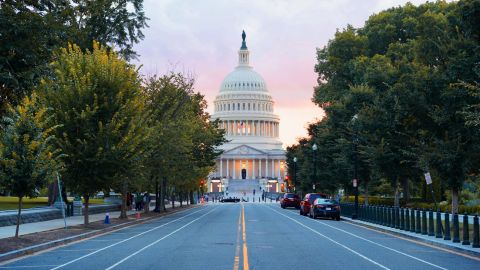A call to action: Urge Congress to support scientific research
The American Society for Biochemistry and Molecular Biology public affairs team and the society's Public Affairs Advisory Committee advocate for robust budgets for the key science agencies that fund ASBMB members: the National Institutes of Health, the National Science Foundation and the Department of Energy. We often ask ASBMB members to reach out individually by writing to their elected officials — and we’re doing that now. We’re asking all members to email their members of Congress to ask for continued funding.
But what do letter-writing campaigns really accomplish?
Congress needs to hear from ASBMB members
Each congressional office on Capitol Hill depends on its constituents, the senator or representative’s voters, to inform decisions and votes on legislation — including budgets. But often legislators are balancing other priorities. This year, for example, House Republicans are focused on cutting federal spending. One of their targets is NIH funding.
The House of Representatives has proposed a 9% cut to the NIH budget; this would have a negative impact on the federally funded researchers that the NIH supports. The Senate proposes essentially flat funding; which would allow the NIH to continue funding the work it has already committed to. The ASBMB is urging Congress to either increase or sustain the NIH’s budget; that’s key to continued support for scientists, including ASBMB members.
Members of Congress listen to their voters. The more they hear about the importance of federal funding for scientific research, the more likely they are to maintain or increase the NIH budget instead of cutting it.
That’s why this week we’re calling for ASBMB members to email their elected policymakers to highlight and emphasize the importance of funding the NIH. (It’s easy to participate; just click on the link and fill out the form. The body of the email is written already.) Congress is currently debating the two proposed budgets for the NIH, and lawmakers must hear directly from scientists about where that money goes and how it supports research across the country.
Ann West, chair of the ASBMB PAAC, stressed the importance of this campaign. “It is imperative that our elected officials hear from those of us in the trenches how devastating cuts to the NIH budget would be,” she said, “especially the resulting reduction in workforce and negative impact on our current and next generation of scientists.”
The Rally for Medical Research
We’ve scheduled this letter-writing effort in conjunction with the Rally for Medical Research, a national call to action to increase the NIH budget organized by the American Association for Cancer Research. More than 350 national organizations and institutions support this event, including the ASBMB.
Health and science policy advocates are meeting with lawmakers and their staffs in congressional offices in Washington, D.C., this week to communicate the importance of the NIH and the work the agency funds. This effort, in particular, will raise awareness about the critical need for robust, sustained and predictable funding increases for the NIH in fiscal year 2024.
“Federal funding, particularly from the NIH, is the lifeblood of academic biomedical researchers,” West said.
You can read more about the rally here.
Enjoy reading ASBMB Today?
Become a member to receive the print edition four times a year and the digital edition monthly.
Learn moreGet the latest from ASBMB Today
Enter your email address, and we’ll send you a weekly email with recent articles, interviews and more.
Latest in Policy
Policy highlights or most popular articles

Building a stronger future for research funding
Hear from Eric Gascho of the Coalition for Health Funding about federal public health investments, the value of collaboration and how scientists can help shape the future of research funding.

Councilors advocate for science on Capitol Hill
ASBMB Councilors meet with their elected officials to advocate for basic scientific research funding and training the next generation of scientists.

Hope for a cure hangs on research
Amid drastic proposed cuts to biomedical research, rare disease families like Hailey Adkisson’s fight for survival and hope. Without funding, science can’t “catch up” to help the patients who need it most.

Supporting science through advocacy and community building
ASBMB calls on scientists to take action as funding cuts and policy shifts threaten the U.S. research enterprise, emphasizing the power of community advocacy and persistence in protecting the future of science.

Seven steps to advocating in your home state
Find out how to schedule, prepare for and conduct a productive district office meeting to communicate the importance of fundamental scientific research funding to your representatives.

ASBMB members call for funding and agency support amidst uncertainty
In 60 meetings on Capitol Hill, scientists urge legislators to reaffirm support for scientific innovation

